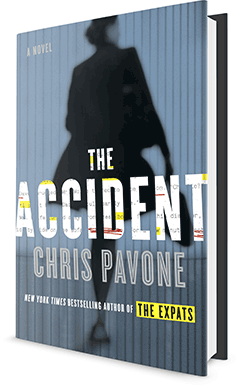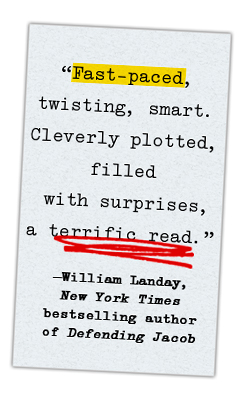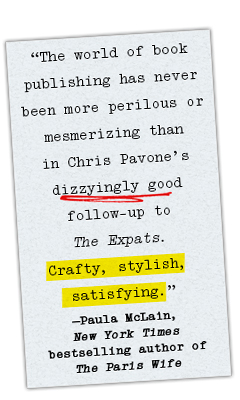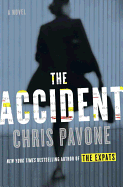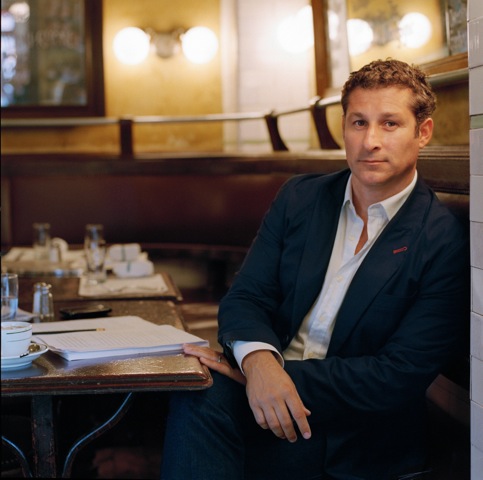The Accident
by Chris Pavone
The book publishing industry has never seemed this sexy and dangerous. Chris Pavone follows up the international success of his debut, The Expats, with a new escapade that blends the worlds of espionage, publishing, corporate corruption and human relationships in one nonstop day of pursuit, flight and struggle among those trying to make a fortune off a manuscript, those trying to prevent its publication, and those just trying to survive the sudden crisis it's brought into their lives.
"But the author isn't one of those possible witnesses. Because if what you are reading is a finished book, printed and bound and distributed into the world, I am, almost certainly, dead." So reads the manuscript of a book entitled The Accident drafted by a shadowy author whose intention to write a sanitized biography of Charlie Wolfe, wunderkind-turned-media-mogul, grew into the decision to expose Wolfe's darkest secrets to the entire world. Beneath Wolfe's veneer of self-made success lies a past of entitlement and cover-ups so vile and far-reaching, Wolfe would kill to keep the truth from seeing the light of day, and he's not the only one. In Copenhagen, a veteran CIA operative will use every means at his disposal to destroy all copies of the manuscript and forever silence the author and anyone unfortunate enough to have read the real story. His lethal determination and cadre of professionals, including Kate from The Expats, will send the lucky scurrying to escape, and leave the unlucky or unaware dead.
When literary agent Isabel Reed receives a copy of the manuscript, it occurs to her to wonder if it's an elaborate hoax aimed at defaming Charlie Wolfe, especially in light of the horrific accident detailed in its pages. Her instincts say otherwise, and they also say possessing a draft of the book could put her in grave peril. Isabel knows if she can get the manuscript published quickly and quietly, its dangerous secrets will be out and the involved parties will no longer stand to gain anything by her death. She passes the draft on to Jeff Fielder, an editor whose love of conspiracy theories is rivaled only by his unspoken but widely known love for Isabel. Unfortunately, Isabel's ambitious assistant had the manuscript long enough to make copies, and suddenly the secret spreads, from the assistant to a ruthless rights director, and on to a Los Angeles producer and a New York publisher in need of a big hit. In one day of action, tension and murder, a tell-all memoir will reshape lives around the world. Throughout the chaos, the anonymous author stays hidden in Zurich, protecting his life and one more excruciating secret.
Wrapped up in this mile-a-minute thriller, meditations on various themes await the reader. Pavone gives us a close look inside the embattled world of publishing and the cutthroat competition for the best manuscripts, backed up by a plot that makes the reader believe life and death really could hinge on the publication of a book. In a business where stars rise and fall as meteorically as those in Hollywood and segments of the industry are disappearing into the maw of the Internet, a tell-all about a media giant could change a career.
At the same time, Pavone paints a stark contrast between the world of the corporate conglomeration, epitomized by Wolfe Media and its privileged, corrupt CEO, and small businesses such as independent bookstores, which his characters revere as champions of literacy and the lifeblood of the publishing industry. The message never becomes didactic, though; the action and mystery develop far too quickly to allow the prose to step into preachy territory.
First and foremost, though, the story explores the layers of betrayal human ambition creates--betrayal of strangers, of loved ones, of our own ideals. Isabel and Jeff have both suffered failed marriages to partners who put work before their relationships or saw them as stepping stones. In their flight from their would-be assassins, both suspect everyone and trust no one, a lesson they both learned prior to these events. However, secondary characters also blunder into the snares and double-crosses that drive the hairpin plot twists, too quick to trust in apparent good fortune. In the end, unforeseen traitorous bargains, shocking truths and revealed connections may leave readers themselves feeling as though they were the true victims of a masterful deception.
Although the story's constant suspense encourages a swift reading pace, setting aside a solid block of time in which to inhale it is advised. When Isabel finishes the in-story manuscript The Accident, she muses, "People in the book business are constantly claiming that 'I couldn't put it down' or 'it kept me up all night' or 'I read it in one day.' This time, all of that was true." Having read the real-world novel The Accident, we know exactly how she feels. --Jaclyn Fulwood



